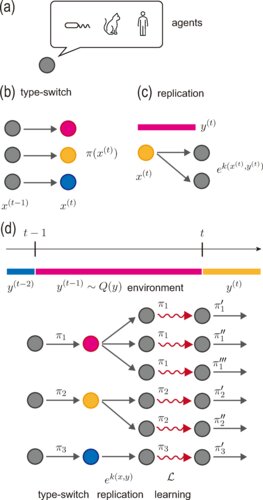Researchers from the Institute of Industrial Science, The University of Tokyo studied the impact of learning from ancestors on the rate of natural selection, and found that the evolutionary process can be accelerated, which may assist in the design of future evolutionary algorithms.
The unique wildlife of the isolated Galápagos islands has long been heralded as living proof of evolution. Powered by the evolutionary process of natural selection, species can improve their fitness over time and adapt to changing environments. Although heritable changes in offspring are traditionally thought to occur due to random genetic mutations, there is increasing evidence of mechanisms that might allow the experiences of one individual to be passed on to the next generation. An especially intriguing example is non-genetic influences, known as epigenetic modifications to genetic material. However, the effect of these non-random heritable changes has not been adequately explored.
Now, a team of researchers from the Institute of Industrial Science, The University of Tokyo has used a mathematical model to examine the implications of intergenerational learning. In a study recently published in Physical Review Research, they have envisioned populations of agents that reproduce asexually, with each agent randomly choosing a trait that determines reproductive success. The probability of expressing a certain trait is called a strategy. In the model, “ancestral learning” can occur when inherited strategies are influenced by past information of an ancestor’s trait. The instructions of ancestral learning need to be simple enough to be plausible within real biological systems. For example, they might be related to epigenetic traits, or the concentration of proteins or mRNAs inside a cell when it divides. “Individual organisms clearly benefit from being able to sense their current environment and choose adaptive behaviors. We considered what would happen if organisms can obtain past information of their ancestor’s behaviors,” explains first author So Nakashima.
Through numerical validation and theoretical analysis, the team found that learning was able to speed up the evolutionary process. This research serves as a theoretical framework for defining and assessing the impact of learning on the process of evolution.
Future work may focus on genetic and evolutionary algorithms in computer science, which are a class of powerful tools for optimizing complex problems. These approaches simulate the evolution of a population of candidate solutions. The better performing solutions in each generation are more likely to be selected and reproduce, sometimes with simulated mutations. “Our model and theory demonstrated that ancestral learning could, in fact, accelerate the evolutionary process,” says senior author Tetsuya J. Kobayashi. By understanding the interplay between learning and natural selection from random changes, this research may lead to improved comprehension of the roles of learning in evolution, as well as more efficient hybrid algorithms that combine reinforcement learning with evolutionary searches.
More information:
So Nakashima et al, Acceleration of evolutionary processes by learning and extended Fisher’s fundamental theorem, Physical Review Research (2022). DOI: 10.1103/PhysRevResearch.4.013069 . journals.aps.org/prresearch/ab … RevResearch.4.013069
Provided by
University of Tokyo
Citation:
The impact of learning from ancestors on the rate of natural selection (2022, February 1)


